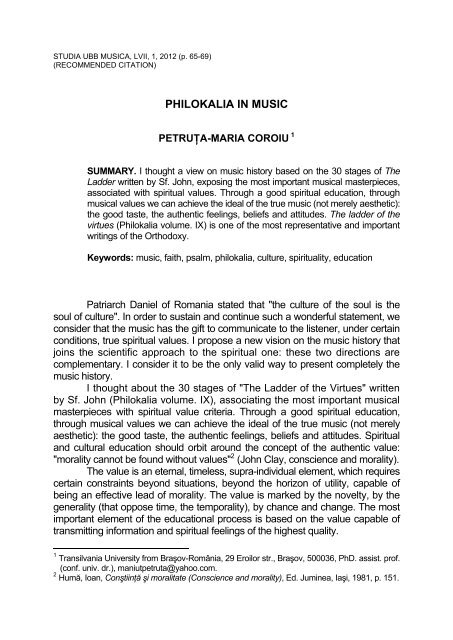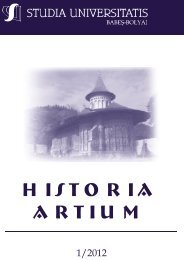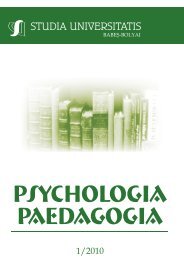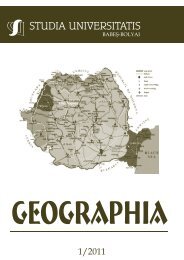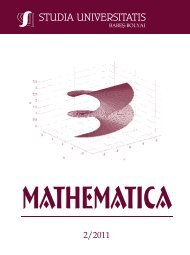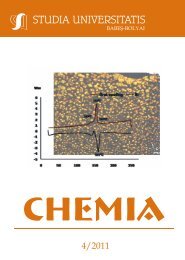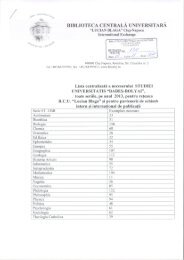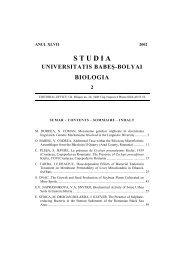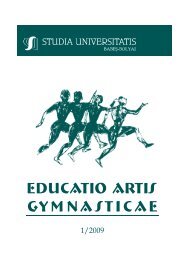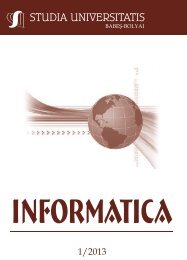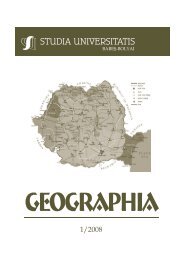musica - Studia
musica - Studia
musica - Studia
Create successful ePaper yourself
Turn your PDF publications into a flip-book with our unique Google optimized e-Paper software.
STUDIA UBB MUSICA, LVII, 1, 2012 (p. 65-69)<br />
(RECOMMENDED CITATION)<br />
PHILOKALIA IN MUSIC<br />
PETRUŢA-MARIA COROIU 1<br />
SUMMARY. I thought a view on music history based on the 30 stages of The<br />
Ladder written by Sf. John, exposing the most important <strong>musica</strong>l masterpieces,<br />
associated with spiritual values. Through a good spiritual education, through<br />
<strong>musica</strong>l values we can achieve the ideal of the true music (not merely aesthetic):<br />
the good taste, the authentic feelings, beliefs and attitudes. The ladder of the<br />
virtues (Philokalia volume. IX) is one of the most representative and important<br />
writings of the Orthodoxy.<br />
Keywords: music, faith, psalm, philokalia, culture, spirituality, education<br />
Patriarch Daniel of Romania stated that "the culture of the soul is the<br />
soul of culture". In order to sustain and continue such a wonderful statement, we<br />
consider that the music has the gift to communicate to the listener, under certain<br />
conditions, true spiritual values. I propose a new vision on the music history that<br />
joins the scientific approach to the spiritual one: these two directions are<br />
complementary. I consider it to be the only valid way to present completely the<br />
music history.<br />
I thought about the 30 stages of "The Ladder of the Virtues" written<br />
by Sf. John (Philokalia volume. IX), associating the most important <strong>musica</strong>l<br />
masterpieces with spiritual value criteria. Through a good spiritual education,<br />
through <strong>musica</strong>l values we can achieve the ideal of the true music (not merely<br />
aesthetic): the good taste, the authentic feelings, beliefs and attitudes. Spiritual<br />
and cultural education should orbit around the concept of the authentic value:<br />
"morality cannot be found without values" 2 (John Clay, conscience and morality).<br />
The value is an eternal, timeless, supra-individual element, which requires<br />
certain constraints beyond situations, beyond the horizon of utility, capable of<br />
being an effective lead of morality. The value is marked by the novelty, by the<br />
generality (that oppose time, the temporality), by chance and change. The most<br />
important element of the educational process is based on the value capable of<br />
transmitting information and spiritual feelings of the highest quality.<br />
1 Transilvania University from Braşov-România, 29 Eroilor str., Braşov, 500036, PhD. assist. prof.<br />
(conf. univ. dr.), maniutpetruta@yahoo.com.<br />
2 Humă, Ioan, Conştiinţă şi moralitate (Conscience and morality), Ed. Juminea, Iaşi, 1981, p. 151.


